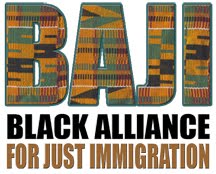Bamako, Mali, West Africa
July 17, 2010
Gerald Lenoir, Executive Director of the Black Alliance for Just Immigration (www.blackalliance.org) and Nunu Kidane, Director of Priority Africa Network (www.priorityafrica.org) were in Bamako, Mali to attend the inaugural gathering of the Pan African Network in Defense of Migrant Rights hosted by Institute for the Research and Promotion of Alternative Development (IRPAD) and funded by Open Society Institute, West Africa (OSIWA). The following blog describes the conditions of African migrants who are deported from North Africa and end up in Mali.

We went by taxi more than 10 miles from the center of Bamako across the Niger River to meet with Ntamag Francois Romero, the director of the Association des Refoulés d’Afrique Centrale au Mail, or ARACEM (Association of Deported Central Africans in Mali). The cab let us out on a main street where we were met by an ARACEM staff member who led us the one block down a potholed dirt road muddied by the morning rain.We entered the gate of the rust brown, adobe-like two-story building that housed offices and a shelter for deportees. The shelter residents greeted us with handshakes and “Bonjours” as we entered the courtyard. We made our way into Ntamag’s office where we introduced ourselves and told him that we were interested in knowing about the migration and deportation experiences of the people who come to the shelter. He graciously told us his own story and about the work of the ARACEM.
Ntamag himself left his home country of Cameroon six years ago. He was deported to Mali from Morocco four years ago. He and other migrants who had experienced deportation founded ARACEM in July 2006. It is funded by Caritas, a Catholic relief agency, and other international funding agencies. The funding is often inadequate to feed and pay for unexpected expenses such as hospitalization when one of the refugees is ill. The center therefore requests donations to purchase additional rice and supplies to feed the increasing number of individuals that depend on it.
An astounding 100 deportees a month come to ARACEM for shelter, food and clothing. They are expelled from Libya, Morocco and Algeria as they make the way from Central and West Africa in an attempt to find work. These three North African countries have signed agreements with European countries to act as external border control agents to prevent migrants from reaching Europe.
Ntamag told us that migrants come to the shelter at the first of the month and in the middle of the month. They have been stripped of their money, identification papers and all of their possessions by the police or border patrol and dropped in the middle of the desert on the border with Mali with no food or water. Some are extremely traumatized by the entire experience, having spent several months and even years in detention before being deported. The difficulty of their situation is too much for some and they “lose their heads,” unable to cope.
The supposed three-day stay usually gets extended to up to ten days after which they must leave because the staff has to make room for the next group of expelled migrants. This leaves the young men in desperate situation with no ability to get resources or identification and no hope of going back or forward. While they are “free” to leave the compound and to look for employment, they have no way to sustain themselves. The government of Mali is one of the few that does not incarcerate refugees in detention centers and they can remain within the country if they so wish.
Many of the migrants are ashamed to return home after being deported and will try desperately to find their way to Europe again. Their families are often destitute and are depending upon them to reach Europe, find work and send part of their earnings home. So they spend their three to ten days weighing their options. If they decide to return home, the staff of ARACEM helps them to contact their family and figure out how to get back to their country—Nigeria, Cameroon, Central African Republic or another country. Some find a way to earn money in Mali and try again to reach Europe. Others, like Ntamag, remain in Mali.
When we asked Ntamag why he left Cameroon, he pointed to government corruption and the exploitation of the natural resources of Cameroon by multinational companies from France, the United States and other countries of the West. Although the vast majority of the people of Cameroon are poor, “Cameroon is not a poor country,” Ntamag tells us.
“The young never have hope,” he says. “You go to Europe to take care of family.”
As we ended our visit, we discussed with Ntamag a project to document the abuses suffered by migrants and a process from them to take their collective cases to the African Union’s Commission on Human and Peoples’ Rights and other international and governmental bodies. We agreed to work with him on developing the project and to help to seek justice for people whose only crime was to cross borders.
To hear Ntamag in his own words, click on the link and view the videotaped interview on YouTube. http://www.youtube.com/watch?v=w8nzAkoPlTM



